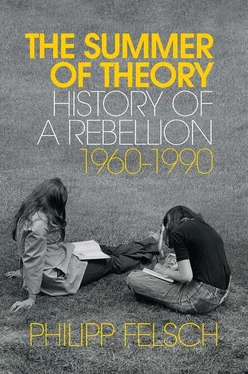Only Jacob Taubes had no such qualms. He took up his activities as a Suhrkamp advisor with the objective of ‘overrunning and transforming the academic market’. 67His tone in the reports he sent to Frankfurt from Paris and New York is thus not professorial; they read more like the situation analyses of a professional industry journalist. ‘ Competition is keen’, he wrote to Michel from the US, where he was taking soundings, and recommended securing as many options as possible ‘because the market is rapidly being picked over from Germany.’ The publisher Rowohlt also had agents on the ground, whose monstrous salaries alone were evidence that they were expected to deliver results. 68It is no coincidence that Taubes often slips English vocabulary, such as the word ‘competition’ above, into his market reports: only a knowledgeable scout would have been capable of his incisive analysis of the American culture industry. 69His intellectual promiscuity, practically free of ideological reservations, also went well with his American habitus. As he later admitted in a book published by Merve, he even supported recruiting the ill-famed constitutional lawyer Carl Schmitt for Unseld’s academic catalogue – a project which failed to overcome Habermas’s resistance and Schmitt’s refusal to ‘enter the Suhrkamp culture’ with his books. 70
Taubes was a global player, however, concentrating his activities mainly on the international market. This was no doubt the role for which he had been chosen. And his dossiers taking stock of the theory books on the market in English and French say a great deal about the West German reception context. Who was Claude Lévi-Strauss again, the guy who landed a big hit in 1955 with Tristes tropiques ? ‘The master who connects everything and has held the interest of intellectual circles in post-Existentialist France for years. L.-S. an ambivalent phenomenon. He thinks he’s the successor of Rousseau, Marx; has integrated elements of Marx, but his “structuralism” is ahistorical.’ And what should one make of Serge Maillet, the young author of The New Working Class , a book everyone was talking about among the Parisian Left? ‘Highly gifted, long in communist unions, but sees that the unions don’t see that a whole new physiognomy of the working class has evolved. Apart from him, such insights are pronounced only “from the right” (since E. Jünger’s The Worker ). A talent for journalism; no professorship; not likely to get one.’ 71Perhaps it is true that Taubes was able to grasp the content of a book just by touching it. What is certain, however, is that he knew how to sketch an intellectual landscape in a few quick strokes of the pen.
Getting the four professors to sit down together proved to be a difficult task. Dieter Henrich was eager to work with Habermas, but preferably not with Blumenberg. Blumenberg in turn recoiled from collaborating with Taubes, who he thought was an ‘unreliable fellow’. 72Taubes, for his part, had the feeling that he was doing more work than the others and refused to do so ‘for the same money’. 73Nor did he make a secret of his disappointment on seeing the proofs of Blumenberg’s Legitimacy of the Modern Age , which he had so warmly recommended to Unseld. 74Only Habermas struck Michel as being a dependable partner ‘without compulsion and without ambitions’, one who ‘quite spontaneously makes the most useful suggestions’. But Habermas was the one who, after a particularly tedious session with Henrich and Blumenberg, asked to be discharged from the ‘bubbling cauldron’ of the Theorie series. ‘I told him very plainly’, Michel reported to Unseld, ‘that the series had been conceived with a view to his collaboration, and that we would not be interested in publishing it if he withdrew.’ 75The editor’s desperate sigh is understandable: ‘It is a shame’, Michel noted, ‘that we do not yet have the technical means to hold conferences without the simultaneous presence of all the participants.’ 76
In spite of the difficulties with the series editors, Unseld and Michel hammered out a first autumn list between 1965 and 1966. The market for theory seemed too promising to permit unnecessary delays. To put weight behind Suhrkamp’s presence, the new series was initially supposed to be flanked by a journal in which ‘in each issue, various philosophers or scholars would critically look at a major philosophical or scientific book (or a life’s work)’. 77Taubes was easily won for this project too: ‘The time for a journal is well chosen, since Merkur and Neue deutsche Hefte seem to be nearing their end.’ As titles for a periodical that would carry on the anticipated legacy of those cultural reviews, he suggested ‘Janus’ and ‘Angelus novus’. The rest of his offer to Michel in August of 1965 sounded less like a collaboration than a friendly takeover. The responsible editor would be Taubes’s partner, the Freie Universität philosopher Margherita von Brentano; Berlin seemed to be the best address for the editorial offices. As the chair of a well-endowed department, Taubes held out the prospect of throwing ‘four to five student assistants into the journal’s pot’ as editorial staff – including a certain Peter Gente, whom Michel might know ‘as the editor of an issue of Alternative on French literary theory’. 78Thus Gente came within a hair’s breadth in 1965 of landing in the Suhrkamp culture. But the journal, whether Janus or Angelus novus , never saw the light of day. Enzensberger’s Kursbuch , which appeared in a pilot issue the same year, probably made another Suhrkamp periodical seem superfluous.
Nonetheless, the episode left a mark. Taubes’s activity as an editorial advisor brought his assistant Gente into contact with the publishing world. His hope of working in publishing gradually took shape during the second half of the sixties. Gente experienced the events of the period as one of the inner circle of the student movement, from the shooting of the student Benno Ohnesorg by a policeman during protests against the Shah of Iran’s visit to Berlin, to the battle between police and students in front of the Berlin courthouse in Tegeler Weg on the day of a hearing to disbar Horst Mahler. 79But even in those tumultuous years of 1967 and 1968, Gente continued to read voraciously. In 1968, he edited a publication of Joseph Stalin’s 1950 pamphlet on ‘Marxism and Problems of Linguistics’ for the Munich publishers Rogner & Bernhard. 80The following year, he developed a concept for a book series of his own. In contrast to his uneven seminar papers, the business idea he pitched to publishers is surprisingly mature, reflecting the acumen of a hunter-gatherer who had been roaming the woods of the intellectual journals for the past ten years. Gente’s concept was to publish theory finds ‘whose prior distribution allows us to assume that the reader interest has not been exhausted’ in a booklet format. He was thinking mainly of articles from foreign journals on discussions ‘in which the last word has not yet been spoken’. The little book on the situation at hand: that was a logical next step from Suhrkamp’s Theorie paperbacks, which were just asking to be outbid. Gente imagined catering for the ‘demand for orientation in the social sciences among a broad diversity of readerships’, audiences which ‘up to now have been considered as a relatively unified public only for fiction’. 81Gente himself had been a part of the chapter of West German intellectual history that this sentence evokes: the shift in reading habits, the declining relevance of artistic writing and the ascendancy of theoretical literature. Theory was to be devoured like novels, and hence made suitable for paperbacks: around 1970, this formula spawned a new growth market. And yet Gente did not succeed in attracting a publisher. Sooner or later, the idea arose of founding his own publishing house. West Berlin, with its low rents, was the ideal place to do so. 82
Читать дальше












